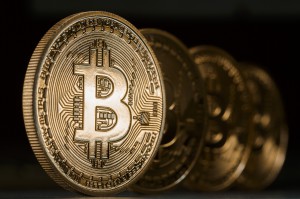Bitcoin: What It Is and Why You Should Care
Whenever I hear the word “coin,” I can’t help but picture Scrooge McDuck diving into a swimming pool full of gold, or think of old arcades and a handful of tokens. Perhaps the creators of Bitcoin had this in mind when they named their company.
These days, everything is on the Internet. In 2009, a software developer decided that money should be too. But this isn’t money in the cold hard cash sense, or even in a less tangible sense, like your credit limit. Instead, Bitcoin uses a cryptographic protocol, or a long string of numbers, to identify each piece of currency.
How Does It Work?
Traditional currency (i.e. paper money and metal coins) is circulated by governments. Bitcoin, on the other hand, does not rely on the banks or the powers that be. Bitcoins are created through “mining,” a process where computers running Bitcoin software essentially solve very complex math equations – specifically, encrypted transactions of other Bitcoin users. Once one of these “problems” is solved, it will be logged into a “block chain” which publicly records the transaction, and rewards the problem solver (or solvers) with newly minted bitcoins.
Put simply, Bitcoin is a program that enables users to use its digital currency to exchange goods, services, or whatever their heart desires. This transaction is then recorded with Bitcoin, which is added to a block sequence that can be mined to create more bitcoins. It is akin to interest or transaction fees, but without actually really being interest or transaction fees…if that makes any sense.
Think of it this way: just as paper money has a serial number, bitcoins receive a specific identifying sequence of numbers. The main difference between the two is that one is regulated by the government and banks, and the other is created almost solely by the people.
Why Should I Care?
Bitcoin has been skyrocketing in popularity. Some traditional businesses, such as coffee shops, have started taking it as payment, and there is even news of Bitcoin ATMs cropping up to allow the basic consumer to buy bitcoins at market rate with their cash.
Right, the market value. In 2011, a mere two years after their creation, the digital currency jumped from a rate of $0.30 to $32. It then slipped back down to $2, only to skyrocket in 2013 to upwards of $266. As of today, a single bitcoin is worth about $517.
Make no mistake, Bitcoin is a volatile, high risk investment (in fact, that figure jumped between 515.2 – 518.2 in the 10 seconds I took to confirm the value). But as an alternative to traditional currency, at least for now, it is certainly worth its weight in gold.
Sounds Too Good to Be True. What’s the Catch?
Back before globalization, when the seas were the gateway to the world, gold, silver, and gems were currency, along with spices and fine silks. Essentially, if someone saw value in it, it could be traded for something else of value, like food or a home. And where there was value, there were individuals seeking to exploit other people’s hard-earned livelihood.
Well, the same is true with Bitcoin, but think “Pirates of the Caribbean” only with hackers instead of Johnny Depp. This has resulted in individuals hijacking other individual’s computers processing power through trojans to mine for bitcoins.
Bitcoin has also been linked to illegal gambling or as an exchange for illicit substances via black market websites. For example, in November of 2013, the FBI seized bitcoins from a black market website that were valued at $28.5 million at the time.
The most common problem facing Bitcoin is plain and simple theft. As you’ll remember, each bitcoin is unique. Just like money that was taken from a wallet, if a bitcoin is taken from the owner’s “wallet,” that bitcoin is gone and probably cannot be traced. Most bitcoin theft occurs when a user’s private key to his online wallet is stolen from a payment processor.
Furthermore, and maybe the most worrisome, is the stability and longevity of this unregulated currency. For example, as of yesterday, February 23, 2014, the world’s largest Bitcoin trading site was taken offline. Just before the website went offline, the trading company’s CEO resigned. This type of erratic behavior of platforms where millions of cryptocurrency is changing hands makes some economists and investors wary to give Bitcoin and similar forms of currency their stamp of approval. However, others view it as typical industry evolution that will force bad companies out of the market.
The Future of Digital Currency
Forms of alternative currency are nothing new, but Bitcoin was the first of its kind, and appears to be in it for the long run. Since its inception in 2009, at least seven other cryptocurrencies have shown up onto the marketplace. While volatile and risky, this gives users the ability to choose an alternative to traditional money.
And if you really think about it, considering exchange rates, the fluctuating value of the dollar, and an unstable economy, traditional currency may not be the solid gold standard people once believed it to be.



Comments